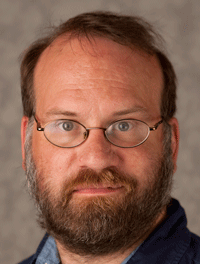Dr. Brett Bolen

Associate Professor of Physics
159 Padnos Hall of Science
Department of Physics
Tel: (616) 331-.2291
Fax: (616) 331-3740.
Email: [email protected]
Education
- Ph.D. University of Mississippi, Oxford MS (2003)
- M.S. University of Mississippi, Oxford MS (1996)
- B.S. University of Evansville, Evansville IN (1993)
Professional Experience
- Associate Professor of Physics, Grand Valley State University, Aug. 2014 - Present.
- Assistant Professor of Physics, Grand Valley State University, 2009 - 2014.
- Visiting Assistant Professor of Physics, Western Kentucky University, 2005 - 2009 .
- Visiting Assistant Professor of Physics, University of Mississippi, Spring 2004 - Spring 2005.
- Visiting Assistant Professor of Physics, Rhodes College, Fall 2003.
Teaching
Courses taught at GVSU (2009 - Present):
- PHY 220/221 - General Physics I & II
- PHY 230/231 - Principles of Physics I & II.
- PHY 303 - World After Einstein
- PHY 307 - Light and Sound
- PHY 330 - Classical Mechanics
- PHY 350 - Quantum Mechanics
- PHY 430 - Advanced Mechanics
- PHY 440 - Advanced Electricity & Magnetism
- PHY 475 - General Relativity
Research Interests
My research is in both classical and quantum aspects of Einstein's theory of gravity known as general relativity. Past research problems have been in
- Black Hole Thermodynamics
- Loop Quantum Gravity
- The generalized uncertainly principle
- The effect of minimum length on quantum mechanical systems
My current interest is in gravitational waves. Gravitational waves are the analog in General Relativity to Electromagnetic waves (light) in Maxwell’s theory of Electrodynamics. In 2015, the Laser Interferometer Gravitational-Wave Observatory (LIGO) experiment directly detected the merger of a pair of black holes of around 36 and 29 solar masses to form a 62 solar mass black hole along and approximately 3 solar masses of energy released in the form of gravitational radiation. Link- https://www.ligo.caltech.edu/ Since then many new detection of gravitational waves have been made. This direct detection led to Kip Thorne, Rainer Weiss and Barry Barish to win the Nobel Prize in 2017.
My research interest in gravitational waves lie in a companion instrument called LISA (Laser Interferometer Space Antenna). As the name implies, LISA will be a space based interferometer which is planned to be launched in 2034 by the European Space Agency (ESA) with NASA as a minor partner. Link - https://www.elisascience.org/
GVSU students have worked on the following students topics related to LISA:
- Spurious Acceleration Noise on the LISA Spacecraft due to Solar Activity
- The Gravitational Signature of Asteroid Populations on LISA Orbits
Research with Undergraduates
Supervised Student Research (2010 - Present):
Current Students
- Steven Pakiela (in cooperation with Dr. Ben Holder)– Whirl zoom orbits around Schwarzschild black holes.
- Benjamin Brown – Modeling light emitted from a body orbiting an extremal black hole.
Past Students
- Ann Lev – Numerical Modeling of Null Geodesics around Massive Bodies.
- David Bronicki – Effect of asteroids on the LISA spacecraft.
- Nikiel Wasta – Experimental modeling of geodesics on spheres.
- Barrett M. Frank- Effect of Solar Wind on LISA spacecraft.
- Brandon Piotrzkowski - Effect of Solar Irradience on LISA spacecraft.
- Eric Van Oeveren – Gravitational collapse in AdS spacetime.
- Bill Richardon - Exploring the Equation of State for Multicomponent Universes (2011).
- Scott Bleiler - Comparison of the Effects of Global Expansion and Gravitational Radiation on Orbiting Bodies (2010).
- Scott Bleiler and Wyatt Brege - Effects of Minimal Length on Quantum Mechanical Scattering (2010)
Recent Publications
- Barrett Frank, Brandon Piotrzkowski, Brett Bolen, Marco Cavaglia, and Shane L. Larson, Modeling spurious forces on the LISA spacecraft across a full solar cycle; Classical and Quantum Gravity, Volume 37, Issue 17, id.175007 (September 2020) arXiv:1912.07715
- E. Berti, Brett Bolen, et. al. , Testing general relativity with present and future astrophysical observations, Class. Quantum Grav. 32, 243001 (2015) arXiv:1501.07274
- Mir Emad Aghili, Brett Bolen, and Luca Bombelli, Effect of accelerated global expansion on the bending of light General Relativity and Gravitation, Volume 49, Issue 1, article id.10, (2014), arXiv:1408.0786
- Keith Andrew, Brett Bolen, and Chad A. Middleton, SOLUTIONS OF HIGHER DIMENSIONAL GAUSS-BONNET FRW COSMOLOGY, Gen.Rel.Grav. 39:2061-2071,2007 [arXiv:0708.0373]
- Keith Andrew, Brett Bolen, and Chad A. Middleton, EFFECTS OF DYNAMICAL COMPACTIFICATION ON D-DIMENSIONAL GAUSS-BONNET FRW COSMOLOGY [hep-th/0608127]
- Brett Bolen, Marco Cavaglia, (ANTI-)DE SITTER BLACK HOLE THERMODYNAMICS AND THE GENERALIZED UNCERTAINTY PRINCIPLE, Gen.Rel.Grav. 37 (2005) 1255-1262 [gr-qc/0411086]
- Brett Bolen, Luca Bombelli, Alejandro Corichi, MINISUPERSPACES: COHERENT AND SEMICLASSICAL STATES I , Class. Quant. Grav. 21 (2004) 4087-4106 [gr-qc- 0404004]
- Brett Bolen, Luca Bombelli, Raymond Puzio, EXPANSION INDUCED CONTRIBUTION TO THE PRECESSION OF BINARY ORBITS. Class. Quant. Grav.18:1173-1178,2001. [gr-qc-0009018]
Professional Affiliations:
- Member of American Physical Society.

